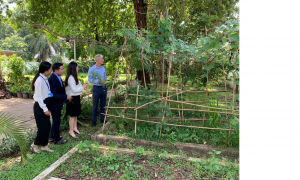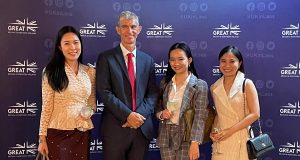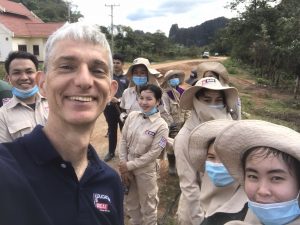June 6, 2023, by lzzre
Geography Alumni Post – John Pearson, Class of 1990
John Pearson, June 2023
I studied Geography at Nottingham from 1987 to 1990, and after graduating I went straight to work at the Foreign Office. Margaret Thatcher was Prime Minister, which gives you an idea of how long ago that was!
At the moment I am the British Ambassador to Laos, and overall I have had a fairly typical Foreign Office career. I have spent about half of my time in London and about half of my time overseas. In London I have had a mix of jobs; some have been geographical, covering specific parts of the world, and some have been focused on a particular area of foreign policy (like the environment).
Before Laos, my overseas postings were in Madrid, Brasilia, Montevideo, Singapore and Mexico City. I think I have been pretty lucky in where I have been able to work!
As Ambassador in Laos I am the British government’s formal representative. So I am responsible for any activities which the British government has locally. We work with a range of institutions locally: including the Lao government, other Embassies or international organisations, British companies, and civil society organisations. We deliver a development programme locally and are here to provide urgent assistance to British nationals who require it.
As a geographer, I have tried to promote sustainability at our Embassy. Climate change is a key priority for us, for example to try and influence Laos to invest more in renewable energy. On the political side, Laos is going to be the chair of ASEAN next year. So at the moment we’re liaising with the Laos government to see how we can support them as the country gets ready for that chairmanship – they will be the focus of political activities in South East Asia.
We also provide about £3 million a year of funding to clear unexploded bombs from the Vietnam War. It is a real hidden tragedy of that war – on average, there was a bombing raid on Laos every eight minutes for nine years. In some villages, over 1000 bombs were dropped for every resident..! As a result there are still millions of unexploded bombs which need to be made safe, otherwise people can’t farm the fields, children can’t go to school, and the drinking wells can’t be safely used.
I think my time studying Geography at Nottingham definitely gave me the tools that you need for diplomacy.
Firstly you have to be able to identify the key issue that you are dealing with. Secondly, you have to be able to know where to go to get sources of information. Thirdly, you have to be able to judge if those sources of information are reliable.
You have to be able to analyse that information, make sense of it and draw conclusions. And then you have to be able to present those conclusions in an accessible form: that could be in writing, by video, or perhaps through a map. But communication of your conclusions is key. And then, finally, you have to be able to work with others to get them on board with your plans.
So there are lots of different skills you need: but I think my Geography training gave me those tools of analysis, communication and working with others that are key for a career in diplomacy.
Overall, the work is very interesting. Living in a foreign country, meeting people from different backgrounds, dealing with lots of different issues: the variety is immense. I know it is a bit of a cliche when people say ‘no two days are the same’. But for me it is really nice that every day I’m doing something different, and I get the chance to leave the office and meet lots of different people.
I always wanted to do work which I felt was important and could change the world. One of the advantages of a career in the Foreign Office is that your work really matters. I think a lot of people see diplomacy as the type of job where you are just seeking to ‘maintain good relations’ with your host country. But I think that’s too simplistic. Real diplomacy is about effecting proper change, really trying to make things better, and helping to improve the organisations and institutions that you’re working with. That is what gets me out of bed each morning.
No comments yet, fill out a comment to be the first




Leave a Reply